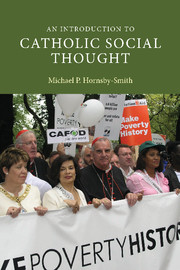Book contents
- Frontmatter
- Contents
- List of tables and figure
- Acknowledgements
- Dedication
- List of abbreviations and acronyms
- PART I SOCIAL REALITY AND SOCIAL ANALYSIS
- PART II THEOLOGICAL RESOURCES
- 3 The kingdom of God
- 4 Christian citizenship
- 5 Catholic social thought
- PART III JUSTICE ISSUES
- PART IV ACTION RESPONSES
- Appendix: Selected campaigning organizations
- References
- Index
4 - Christian citizenship
Published online by Cambridge University Press: 14 January 2010
- Frontmatter
- Contents
- List of tables and figure
- Acknowledgements
- Dedication
- List of abbreviations and acronyms
- PART I SOCIAL REALITY AND SOCIAL ANALYSIS
- PART II THEOLOGICAL RESOURCES
- 3 The kingdom of God
- 4 Christian citizenship
- 5 Catholic social thought
- PART III JUSTICE ISSUES
- PART IV ACTION RESPONSES
- Appendix: Selected campaigning organizations
- References
- Index
Summary
CITIZENSHIP
In the previous chapter we saw that there are considerable scriptural and theological resources available for reflecting on the imperative to seek the realization of the kingdom of God here ‘on earth as in heaven’ and to strive for social justice. But there are other valuable resources, notably key values, principles and ideologies which have arisen in secular society, some of which were bitterly resisted for decades by the Church and which have only in recent years come to be accepted. In this chapter, we will consider the concept of citizenship and the rights and obligations it implies. St Paul reminded the Christians of Ephesus (2:19) that they were ‘fellow-citizens with the holy people of God and part of God's household’. The traditional Catholic position has always been to stress the dignity of each individual human person created in the image of God and to be suspicious of any tendency to reduce that to the status of citizen of a state. The state exists for the benefit of its citizens and not vice-versa. Cardinal Cormac Murphy O'Connor has stressed that the Catholic sense of citizenship is to be found in seeking the ‘Common Good’. In this chapter we will discuss the participation of citizens in God's kingdom and also the three characteristics of citizenship which emerged out of the French Revolution of 1789: freedom, equality and, to use the modern papal term, solidarity. Our aim is to offer a Christian perspective in dialogue with secular approaches.
- Type
- Chapter
- Information
- An Introduction to Catholic Social Thought , pp. 62 - 84Publisher: Cambridge University PressPrint publication year: 2006



